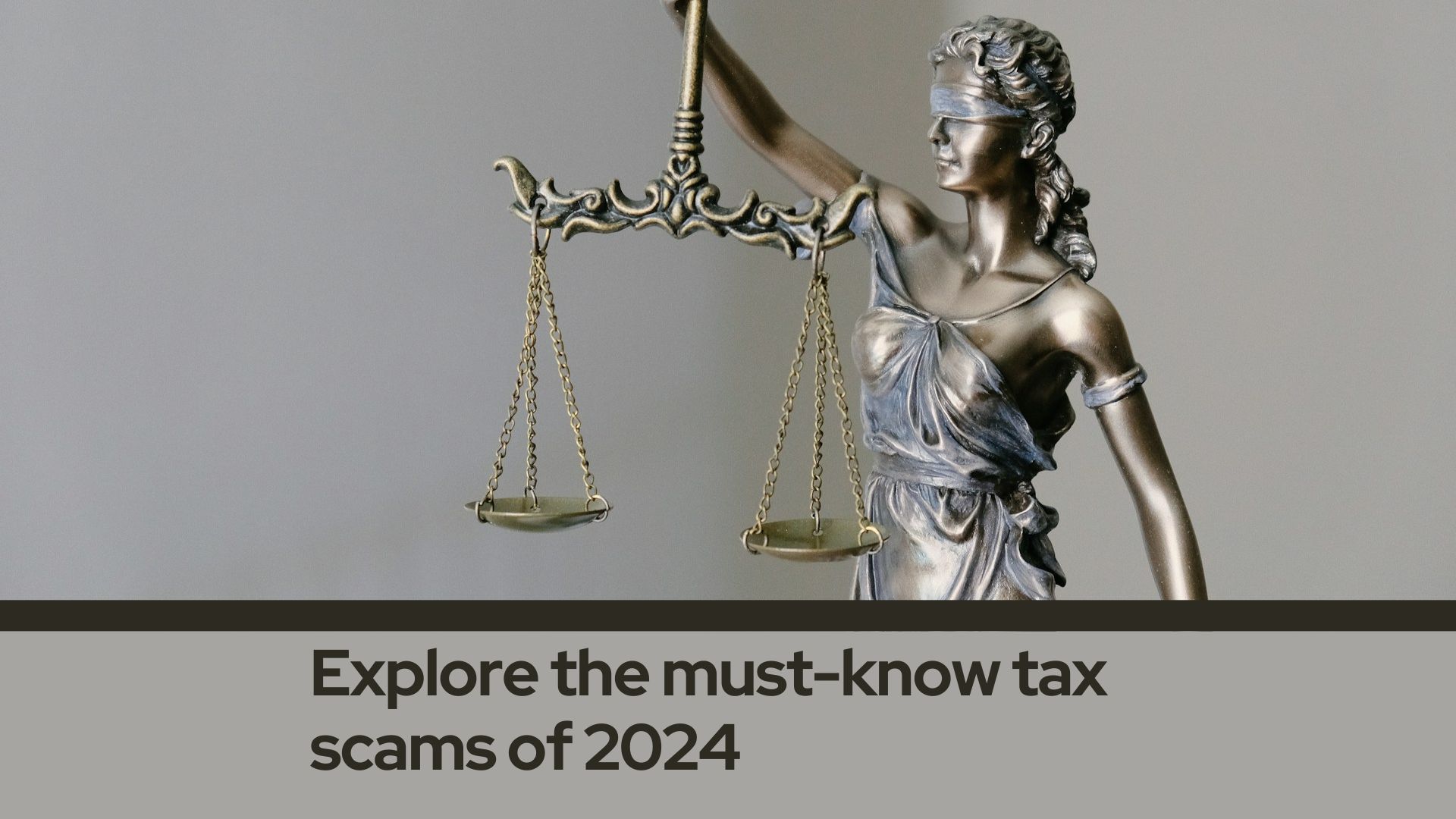The shadow of tax fraud, which hampers the process for honest taxpayers to file their returns, is growing with each passing year as the tax season approaches. These fraud schemes are becoming more sophisticated and difficult to detect in 2024, which makes it necessary for individuals and businesses to remain alert.
Tax fraud is a yearly problem, but they’re taking new forms and preying on the uninformed and the unknowing. In addition to threatening personal financial security, these frauds also undermine the integrity of the tax system as a whole. Scammers have discovered new ways to deceive taxpayers, including the use of artificial intelligence in creating convincing fake communications and using social media to spread misleading tax advice as technology advances.
The Internal Revenue ServiceIRS has been issuing warnings about a variety of frauds, e.g.phishing messages claiming to have recalculated the tax refund and IRS impersonators demanding payment in unconventional ways like gift cards. These fraudulent activities are not confined to the Digital World; they can also be seen in phone calls and face-to-face relationships.
The first line of defense against such deceptive practices is to be aware. Taxpayers should be educated about the signs of fraud and the precautions they can take to avoid them. Remember, if something sounds too good to be true, such as an unexpected tax refund or an offer to settle tax debts for a fraction of the amount due, it is likely to be a fraud.
To combat these threats, the Internal Revenue Service has issued a list of the “Dirty Dozen” scams that are most commonly encountered by taxpayers. This list is a valuable tool for identifying possible fraud and preventing the traps that can result in financial loss or identity theft.
This article will look at the most recent tax frauds that have been detected in 2024, the IRS response to these threats, and practical tips for protecting personal and financial information as we continue our focus on this issue. Taxpayers could navigate the tax season with confidence, making sure that they complied with the law and safeguarding their property against scam artists if they were to stay informed and careful.
The Latest Tax Scams
We must keep an eye on the most recent tax frauds that have come to light as we head into the 2024 taxation season. These frauds, which use new technologies and psychological tricks to deceive taxpayers, are not only becoming more frequent but also more sophisticated. Here is a detailed look at some of the most frequent scams you should be on guard for:
In the scammer toolkit, phishing emails are still a common theme. The taxpayers report receiving an email claiming that their refund has been calculated this year, Such messages often appear legitimate and imitate the branding or language of trusted tax preparation software, as well as other IRS entities. Nonetheless, inconsistencies and errors that betray the false nature of their fraud can be detected at a more detailed glance.
Adding to the complexity, scammers are starting to use artificial intelligence tools to create more authentic communications. These AI frauds are capable of generating real images, writing compelling copy, and even creating complete websites in a fraction of the time that it has taken to do so before. The errors are becoming less frequent and more difficult to detect, even though they may still contain design and writing errors.
IRS Impersonation and Demands for Payment
Another common scam involves impersonators of the IRS demanding payment through unconventional means, such as gift cards. These scammers often use aggressive tactics, threatening legal action or claiming that immediate payment is necessary to avoid arrest. It’s important to remember that the IRS will never demand payment in this manner.
Calls from Fake Financial Institutions
Calls claiming to be from reputable financial institutions, like the FDIC, have also been reported. These calls are designed to extract personal information or money from unsuspecting victims.
Threats to Personal Identity
Some scammers go as far as threatening to cancel your Social Security Number (SSN) if you do not comply with their demands. This type of threat is particularly alarming as it targets one’s sense of identity and security.
Misleading Social Media Advice
Social media platforms have also become a breeding ground for tax scams. Misleading advice can lead thousands of taxpayers to file inflated refund claims. The IRS has warned against scams centered around the Fuel Tax Credit, the Sick and Family Leave Credit, and household employment taxes. These scams often involve legitimate tax provisions but are twisted to deceive taxpayers into believing they are entitled to large refunds.
The Role of ‘Ghost Preparers’
‘Ghost preparers’ are tax preparers who promise big refunds and then disappear after filing fraudulent claims. They often exploit credits and deductions to inflate refunds illegally.
The IRS’s Response to Tax Scams in 2024
In response to the evolving threat of tax scams, the Internal Revenue Service (IRS) has taken a proactive stance to educate and protect taxpayers. Here’s a look at the measures the IRS has implemented in 2024:
Annual Dirty Dozen List
The IRS kicked off its annual “Dirty Dozen” list with a warning about phishing and smishing scams. This list is a cornerstone of the IRS’s educational efforts, highlighting the twelve most common and dangerous scams that taxpayers may encounter. The goal is to raise awareness and help taxpayers recognize and avoid these fraudulent schemes.
Consumer Alerts and Warnings
The IRS issued consumer alerts following concerns about a series of tax scams and inaccurate social media advice that led thousands of taxpayers to file inflated refund claims. These alerts serve as a direct communication channel to warn taxpayers about the latest scams and provide guidance on how to avoid falling victim to them.
Combatting Misinformation
The IRS has identified and warned against scams centered around the Fuel Tax Credit, the Sick and Family Leave Credit, and household employment taxes. By clarifying the eligibility criteria for these credits, the IRS aims to combat the misinformation that leads to false claims and delayed refunds.
Security Summit and Collaborative Efforts
As a member of the Security Summit, the IRS has worked with state tax agencies and the nation’s tax industry to implement a variety of internal security measures. This collaborative effort focuses on educating taxpayers about scams and fraudulent schemes throughout the year, which can lead to tax-related identity theft.
Guidelines for Reporting Scams
The IRS provides detailed guidelines for reporting phishing attempts, financial losses, and abusive tax schemes or preparers. Encountering or suspecting an IRS scam should prompt immediate action, and the IRS encourages taxpayers to report these incidents to help prevent further fraud.
Strengthening Internal Measures
The IRS continues to strengthen its internal measures to protect taxpayers, businesses, and the tax system from cybercriminals and deceptive activities. This includes enhancing the fraud review process and implementing advanced technologies to detect and prevent scams.
How Scams Work
Understanding the mechanics behind tax scams is crucial for staying protected. In 2024, scammers have refined their tactics, exploiting both new technology and human psychology to deceive taxpayers. Here’s a look at how these scams operate:
Phishing and Spearphishing
Phishing scams involve unsolicited emails or texts that appear to be from legitimate organizations, such as the IRS or financial institutions. These messages often contain urgent requests for personal information or links to fake websites designed to steal your data. Spearphishing is a more targeted form of phishing, where scammers focus on a specific organization or individual, crafting messages that seem highly credible.
Social Media Misinformation
Social media platforms can quickly spread inaccurate or misleading tax advice. Scammers use these channels to promote schemes that encourage people to submit false information to claim refunds or tax credits they’re not entitled to, like the Employee Retention Credit.
Third-Party Account Setup Scams
Some scammers offer to help set up a taxpayer’s IRS Online Account, but their real intention is to steal personal information. Taxpayers should always access their accounts directly through the official IRS website.
Unscrupulous Tax Return Preparers
Not all tax preparers are trustworthy. ‘Ghost’ preparers may promise large refunds and then file fraudulent claims. They often refuse to sign the tax return or include their IRS Preparer Tax Identification Number, which is a legal requirement.
Offer in Compromise Mills
Offer in Compromise (OIC) mills exploit taxpayers by making exaggerated claims about settling tax debts for less than the full amount owed. They often charge exorbitant fees for services that many taxpayers could obtain directly from the IRS.
The Lure of Quick Refunds
Scammers often entice victims with the promise of quick refunds. They may file claims in the victim’s name, collect the refund from the government, and then disappear before the fraud is detected.
Threats and Intimidation
Scammers impersonating the IRS may use threats and intimidation to bully people into paying fabricated tax bills. They may demand immediate payment without allowing the victim to question or appeal the amount owed.
Protecting Yourself and Your Business
In the face of rising tax scams, protecting your personal information and your business’s financial integrity is more important than ever. Here’s an expanded section on how to safeguard against these threats in 2024:
Stay Informed
Knowledge is power when it comes to avoiding tax scams. Stay updated on the latest scam tactics by regularly checking trusted sources like the IRS website or reputable financial news outlets. Being aware of common scam signs can help you recognize and avoid them.
Secure Communication
Be cautious of unsolicited communications. The IRS will not initiate contact with taxpayers via email, text messages, or social media channels to request personal or financial information. Always verify the authenticity of any communication claiming to be from the IRS or other tax authorities.
Use Secure Payment Methods
When making tax payments, use secure and recognized payment methods. Avoid making payments via methods that scammers favor, such as gift cards or wire transfers. If you’re unsure about the correct payment method, consult the official IRS payment options page.
Protect Sensitive Information
Safeguard your Social Security Number, bank account details, and other sensitive information. Do not share this information unless you are sure of the recipient’s identity and the necessity of the disclosure.
Vet Tax Preparers Thoroughly
If you use a tax preparer, choose one who is reputable and has a track record of integrity. Ensure they have a Preparer Tax Identification Number (PTIN) and check their history with the Better Business Bureau or state boards of accountancy for any disciplinary actions.
File Taxes Early
Filing your taxes early can prevent scammers from filing fraudulent tax returns in your name. This proactive step can also give you more time to address any issues that may arise during the filing process.
Implement Strong Cybersecurity Measures
Use strong, unique passwords for all your accounts and enable two-factor authentication where available. Regularly update your computer’s security software to protect against malware and viruses.
Monitor Financial Accounts
Keep a close eye on your bank and credit card statements. Report any unauthorized transactions immediately to your financial institution.
Educate Your Employees
If you own a business, educate your employees about tax scams. They should know how to recognize phishing attempts and other fraudulent activities.
Case Studies
To illustrate the real-world impact of tax scams, let’s delve into some case studies that highlight the cunning tactics used by scammers and the consequences for their victims. These examples from 2024 underscore the importance of vigilance and education in combating tax fraud.
Case Study 1: The Phishing Epidemic
According to McAfee’s 2024 Tax Scam Study, Americans have lost an average of $8,199 per person to tax-related phishing and smishing scams. The study revealed that states like Texas, New York, and California saw the highest percentage of people receiving fraudulent messages about tax refunds. These messages often contained malicious links to fake refunds or statements, leading to significant financial losses.
Case Study 2: The Multi-Million Dollar Refund Scam
In India, the Enforcement Directorate arrested a businessman involved in a Rs 263 crore fake tax refund scam. The scam was orchestrated by a tax official in Mumbai, who, along with accomplices, fraudulently generated and issued tax deducted at source (TDS) claims. This case highlights the scale at which tax scams can operate and the collaboration between corrupt officials and criminals.
Case Study 3: The Tax Preparation Clicking Capitals
McAfee’s study also identified the “Tax Preparation Clicking Capitals” – states where a high percentage of people clicked on scam links in fraudulent messages from tax preparation software companies. This case study emphasizes the danger of engaging with unsolicited messages and the ease with which taxpayers can be lured into scams.
Case Study 4: Offer in Compromise (OIC) Mills
Offer in Compromise mills have been exploiting taxpayers by falsely promising to settle tax debts for pennies on the dollar. These scammers charge high fees for services that are often ineffective and prey on the desperation of those in debt to the IRS.
Case Study 5: The Rise of AI-Powered Scams
The use of artificial intelligence in crafting tax scams has become more prevalent. AI-powered messages and deepfake videos or audio have been used to create highly convincing scams, leading to a new wave of challenges for both taxpayers and authorities.
Conclusion
As we wrap up our exploration of tax scams in 2024, it’s clear that the landscape of tax fraud is ever-changing and increasingly complex. The conclusion of this article serves not only as a summary but also as a final call to action for readers to remain vigilant and proactive.
The IRS has issued multiple warnings about the rise of sophisticated scams, particularly those involving false claims for credits like the Fuel Tax Credit, Sick and Family Leave Credit, and household employment taxes. These scams have led to delayed refunds and the need for taxpayers to provide legitimate documentation to support their claims. The IRS continues to combat these fraudulent activities by catching them during their fraud review process, but the responsibility also lies with taxpayers to stay informed and cautious.
Taxpayers who have fallen victim to these scams face a lengthy and complicated review process, and in some cases, may even encounter steep financial penalties, audits, or criminal action for improper claims. It’s a sobering reminder that the consequences of falling for a tax scam can extend far beyond the immediate financial loss.
The common thread among the various types of tax scams is the exploitation of taxpayer trust and the use of deceptive tactics to lure victims into fraudulent schemes. Whether it’s through phishing emails, misleading social media advice, or unscrupulous tax preparers, scammers have demonstrated a relentless pursuit of illegal profit.
In conclusion, staying informed about the nature of tax scams and the IRS’s efforts to prevent them is crucial. Taxpayers must exercise due diligence when filing their returns, safeguard their personal information, and be skeptical of too-good-to-be-true offers. By taking these steps, you can protect yourself and your finances from the myriad of scams that surface during tax season.
Remember, the best defense against tax scams is a combination of awareness, skepticism, and the willingness to verify information before acting on it. As we move forward, let’s commit to maintaining a high level of vigilance and encouraging others to do the same, ensuring that our tax system remains fair and secure for all.
Check out more articles!








